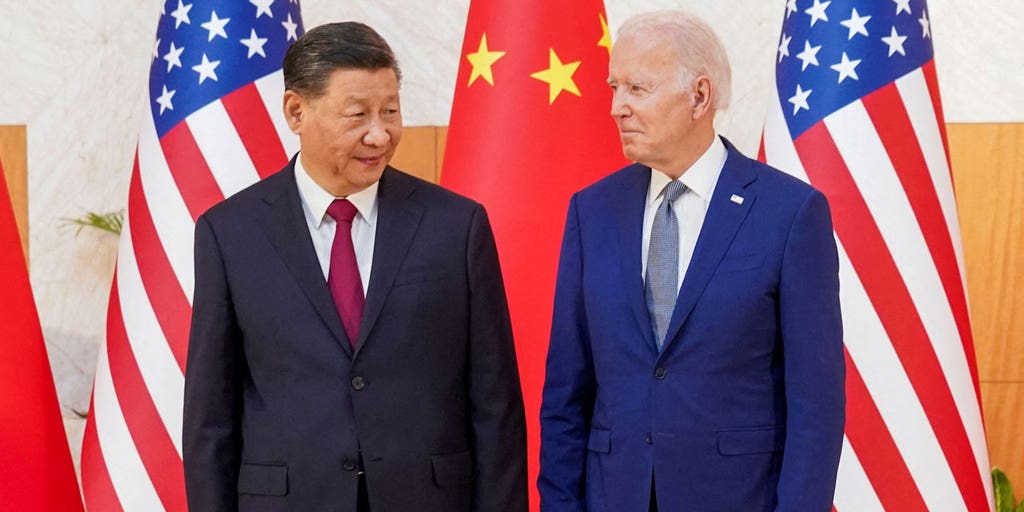The U.S.-China relationship has put Washington in a challenging position when it comes to negotiating an artificial intelligence (AI) agreement with Beijing, despite China’s expressed willingness to engage in discussions.
Gordon Chang, an expert on China and a senior fellow at the Gatestone Institute, expressed skepticism about China’s intentions, stating that China’s interests likely do not align with those of the United States or the international community.
Chang cautioned that entering into an unenforceable agreement could lead the United States to forgo leveraging the significant advantages that AI offers in targeting conventional munitions.
While the U.S. and China are at the forefront of AI development, with the U.S. possessing advanced chips crucial for AI training, concerns remain about the potential implications of collaborating with China in this domain, as highlighted by Axios.
The Influence of AI on Voter Behavior and Electoral Integrity
 President Biden and Chinese President Xi Jinping met during the G-20 leaders’ summit in Bali, Indonesia, on Nov. 14, 2022. (REUTERS/Kevin Lamarque/File Photo)
President Biden and Chinese President Xi Jinping met during the G-20 leaders’ summit in Bali, Indonesia, on Nov. 14, 2022. (REUTERS/Kevin Lamarque/File Photo)
Following China’s participation in the AI safety summit at Bletchley Park, the country agreed to collaborate with the U.S. and the European Union (EU). Subsequently, President Biden and Chinese President Xi Jinping engaged in discussions in San Francisco, addressing various crucial topics, including AI.
There is a growing expectation that the U.S. and China could potentially reach an agreement to regulate the advancement of AI. However, critics remain doubtful about the feasibility and benefits of such a pact for the U.S.
Unenforceability of AI Agreements with China
According to Chang, any agreement with China would likely be unenforceable, especially concerning monitoring military software and technology compliance—an aspect that both nations are unlikely to concede on, despite maintaining military communication channels post the San Francisco meeting.
Chang also raised concerns about the potential consequences of technology transfer to countries lacking advanced AI capabilities if cooperation with China were deemed safe, emphasizing the risks associated with such exchanges.
 Attendees observe an AI robot demonstrating calligraphy at the 2022 World Artificial Intelligence Conference (WAIC) in Shanghai, China, on Sept. 1, 2022. (Fang Zhe/Xinhua via Getty Images)
Attendees observe an AI robot demonstrating calligraphy at the 2022 World Artificial Intelligence Conference (WAIC) in Shanghai, China, on Sept. 1, 2022. (Fang Zhe/Xinhua via Getty Images)
In his analysis, Chang highlighted that any collaborative effort with China could inadvertently provide Beijing with an advantage, allowing the country to bridge the technological gap while gaining access to undisclosed information and resources, potentially extending its influence beyond the realm of AI.
The Emergence of a Potential Competitor to Google in the Search Industry
Nathan Picarsic, a China policy expert and senior fellow at the Foundation for Defense of Democracies, emphasized the lack of leverage the U.S. holds over China, particularly concerning market access and the need for companies to navigate the evolving landscape of U.S.-China relations.
 French Minister for Economy, Finance, Industry, and Digital Security Bruno Le Maire delivers a speech at the U.K. Artificial Intelligence (AI) Safety Summit in Bletchley Park, England, on Nov. 2, 2023. (Justin Tallis/AFP via Getty Images)
French Minister for Economy, Finance, Industry, and Digital Security Bruno Le Maire delivers a speech at the U.K. Artificial Intelligence (AI) Safety Summit in Bletchley Park, England, on Nov. 2, 2023. (Justin Tallis/AFP via Getty Images)
Picarsic underscored the challenges posed by the absence of reciprocity in market interactions with China, hindering the enforcement of regulations within the Chinese market. He highlighted China’s advantages, including exclusive access to protected data and the capacity to swiftly implement software advancements on a large scale.
In conclusion, Picarsic expressed skepticism about the viability of striking a beneficial deal with China in the AI sector, citing China’s track record as an unreliable partner and the inherent disadvantages in pursuing such agreements.










